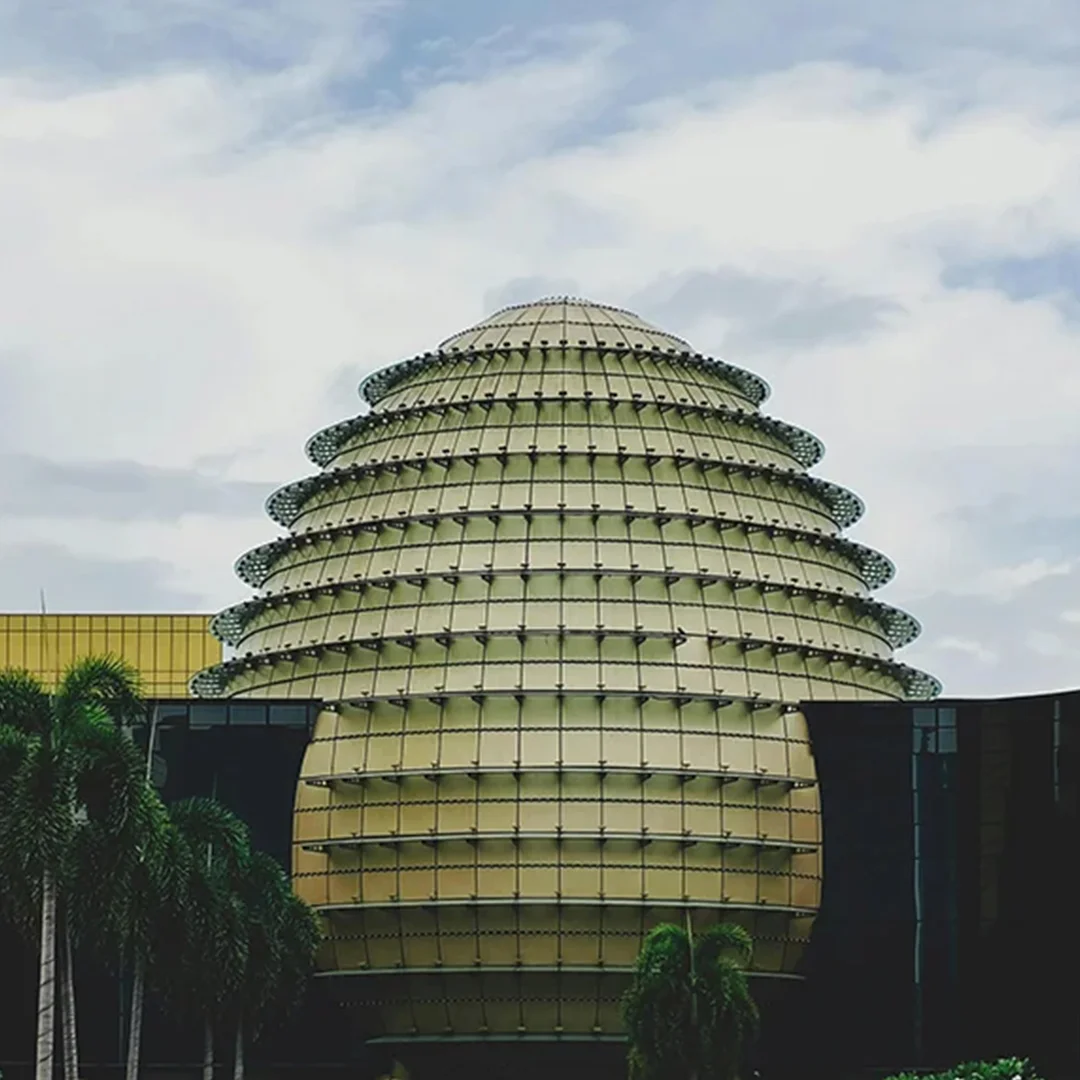Home › Doing business in Manila
Learn more about Doing Business in Manila
Manila, the capital region of the Philippines, is the country’s political, economic, and cultural hub. It comprises 16 cities and 1 municipality, including major business districts like Makati, Taguig (Bonifacio Global City), and Quezon City. As the center of commerce and finance, Metro Manila offers a diverse, fast-paced market ideal for startups, SMEs, and multinational corporations.
| Population 13.5 million | GDP Contribution Over 36% of national GDP | Startup Ecosystem ~500 active startups |
| Average Salary PHP 45,000/month | Office Rent (CBD) PHP 1,000–1,500/m²/month | Key Sectors BPO, finance, real estate, tech, retail, logistics |
Economic Landscape of Manila
1. Key Economic Indicators
Manila generated over PHP 6.3 trillion in GDP making it the most economically significant region in the country (Philippine Statistics Authority). The region attracts the majority of Foreign Direct Investment (FDI) due to its infrastructure, talent pool, and regulatory advantages.
2. Major Industries in Manila
Business Process Outsourcing (BPO): The BPO industry remains a cornerstone of Manila’s economy, employing over 1 million workers. The region is home to top BPO hubs like Makati and Taguig, with a wide range of customer service, IT, and back-office operations.
Financial Services: Makati and BGC host major local and international banks and financial institutions. Additionally, the Philippine Stock Exchange is headquartered in Metro Manila, solidifying its position as a financial powerhouse.
Technology and Startups: The startup ecosystem is thriving, with innovation hubs such as QBO Innovation Hub playing a key role. Government initiatives like Startup Pilipinas and DICT innovation programs further support this rapid growth.
Real Estate and Construction: Driven by urbanization and substantial infrastructure investments, the demand for both commercial and residential properties in Manila continues to rise. This has been reflected in ongoing construction projects and high demand for prime real estate.
Retail and Logistics: Manila is a retail and distribution powerhouse in Southeast Asia, with a significant presence of global brands and logistics companies, strengthening its role as a central hub for retail and logistics activities.
Legal Environment for Businesses
1. Company Registration Process
Setting up a business in Manila involves several key steps and registrations. For corporations and partnerships, the first requirement is registering with the Securities and Exchange Commission (SEC) via its online platform. Sole proprietorships, on the other hand, must register with the Department of Trade and Industry (DTI) to secure a business name. Once registered, all entities must obtain a Taxpayer Identification Number (TIN) and register for official receipts with the Bureau of Internal Revenue (BIR). Local requirements also include securing a Barangay Clearance and a Mayor’s Permit from the city or municipality where the business is located. Depending on the structure and sector of the business, the full process can take several weeks. Our Company Registration Services can guide you through each step to ensure compliance and efficiency.
2. Corporate Compliance Requirements
Once a company is registered, maintaining regulatory compliance is essential. All corporations are required to submit an annual General Information Sheet (GIS) and Audited Financial Statements to the SEC, which ensures transparency and legal accountability. Tax compliance is managed by the BIR, and businesses must file monthly, quarterly, and annual tax returns, including VAT, income tax, and withholding taxes missing deadlines can lead to heavy penalties. Businesses must follow the Philippine Financial Reporting Standards (PFRS) for accounting, which are aligned with global IFRS standards. Local government units (LGUs) may also conduct inspections to verify compliance with municipal regulations. Explore our Accounting and Tax services for comprehensive support.
3. Taxation Overview
Philippines’ taxation system includes several key taxes for businesses:
| ➤ Corporate Income Tax (CIT): The corporate income tax is 25% for corporations with a net taxable income exceeding PHP 5 million. For domestic SMEs with net taxable income under PHP 5 million, the rate is reduced to 20% under RA 11534. |
| ➤ Value Added Tax (VAT): The standard VAT rate is 12% on the sale of goods, services, and imports, as outlined in the BIR VAT Guide. |
| ➤ Withholding Tax:Withholding tax rates vary depending on the type of income and recipient, ranging from 1% to 15%. |
| ➤ Local Business Taxes (LBT): Local business taxes are imposed by local government units (LGUs) and typically range from 1% to 3% of gross receipts, depending on the location. |
| ➤ Capital Gains Tax (CGT): The CGT is 6% on the sale of real property and 15% on shares that are not traded on the Philippine Stock Exchange (PSE). |
Political and Regulatory Landscape
1. Government Support for Businesses
The Philippine government actively promotes investments through various incentive programs designed to attract both local and foreign investors. The Board of Investments (BOI) and the Philippine Economic Zone Authority (PEZA) provide tax exemptions, grants, and other benefits to businesses in key industries such as manufacturing, IT, and renewable energy. Additionally, the government has introduced reforms under the Ease of Doing Business Act to streamline registration processes, making it easier to set up a business in Metro Manila. These initiatives not only make Metro Manila an attractive destination for entrepreneurs but also foster long-term economic growth. Our Business Visa services can assist you in leveraging these opportunities.
2. Key Regulations to Consider
Intellectual Property: The Philippines offers strong intellectual property (IP) protections to safeguard trademarks, patents, and copyrights. Businesses are encouraged to register their intellectual property with the Intellectual Property Office of the Philippines (IPOPHL) to secure their assets and ensure legal protection. Ask for our Trademark Registration services to ensure your assets are secure.
Labor Laws: Philippines labor laws are comprehensive, covering Employment Contracts, working hours, minimum wages, and employee benefits.The Philippine Labor Code governs employment contracts, working hours, wages, and employee benefits. Businesses must comply with the regulations set by the Department of Labor and Employment (DOLE) to ensure lawful hiring practices, proper employee management, and protection of workers’ rights.
Environmental Regulations: Companies in Manila must adhere to strict environmental guidelines enforced by the Department of Environment and Natural Resources (DENR). These include regulations for waste management, pollution control, and resource conservation, all aimed at promoting sustainability. We offer Business Contracts and Compliance Services to help you meet these standards.
Geographic and Demographic Insights
1. Strategic Location and Infrastructure
Manila’s strategic location in Southeast Asia makes it a central hub for trade, commerce, and cultural exchange. Key infrastructure includes:
| ➤ Ninoy Aquino International Airport (NAIA): The main gateway for international flights to and from the Philippines, handling over 40 million passengers annually. |
| ➤ Manila Port: A vital seaport for the Philippines and one of the busiest in Southeast Asia, processing millions of TEUs (Twenty-foot Equivalent Units) per year. |
| ➤ Public Transport Network: Manila boasts a comprehensive public transport system including buses, trains, jeepneys, and ferries, with ongoing projects like the Metro Manila Subway further improving connectivity and easing mobility across the region. |
2. Workforce and Urbanization
Manila has a highly educated and diverse workforce, supported by prestigious universities and educational institutions such as University of the Philippines and De La Salle University. The region’s population exceeds 13 million, with a steady annual growth rate of approximately 1.3%. This growing population, combined with a youthful workforce, presents tremendous opportunities in various sectors, including retail, real estate, and services. Furthermore, Metro Manila is experiencing rapid urbanization, which leads to expanding markets and business opportunities.
Property Investment in Manila
1. Renting Property
Manila offers lucrative opportunities for investors looking to rent out residential or commercial properties. The city’s growing population and urbanization trends create a high demand for rental properties, particularly in key business districts like Makati, Bonifacio Global City (BGC), and Ortigas. The demand for both office spaces and residential units remains strong, especially among multinational companies, expatriates, and young professionals. Rental yields in prime locations tend to be competitive, making it an attractive option for long-term investment. Investors should explore opportunities in commercial buildings, mixed-use developments, and residential towers in these high-demand areas. Explore our Property Management services to secure your investment.
2. Buying Property
Purchasing property in Manila is considered a solid long-term investment. The region’s real estate market is stable, with consistent price appreciation, particularly in prime locations like Makati, BGC, and Quezon City. Manila’s continued urban development, combined with infrastructure projects like the Manila Subway, is expected to increase property values over the next several years. Foreign investors can purchase property in Manila, though they must comply with the legal requirement of owning no more than 40% of the land in a given property. Residential condominiums, office buildings, and mixed-use developments are particularly attractive to foreign buyers. Learn more about our Property Acquisition Services.
3 Success Stories from Manila
1. Zalora: Zalora, an online fashion retailer, was founded in 2012 in Manila by a group of entrepreneurs, including Paulo Campos. It quickly became one of the leading e-commerce platforms in Southeast Asia, offering a wide array of fashion brands. Zalora revolutionized online shopping in the region by focusing on customer experience and fast delivery. By 2015, Zalora reported over $100 million in sales and expanded its reach across multiple Southeast Asian countries. Today, it boasts over 15 million monthly users and offers over 50,000 products from more than 1,000 brands, maintaining its position as one of the top players in the online retail market.
2. PayMaya: PayMaya, a digital payment platform, was founded in 2007 in Manila and has since become one of the leading financial technology companies in the Philippines. It offers a range of services, including mobile wallets, payment processing, and digital banking solutions. By providing accessible and secure financial services, PayMaya has helped over 40 million Filipinos manage their finances online. The company has raised over $250 million in funding, with its parent company, Voyager Innovations, valued at over $1 billion. PayMaya continues to expand its services, solidifying its position in the fintech industry.
3. Angkas: Angkas, a motorcycle ride-hailing service, was founded in 2016 in Manila by George Royeca and his wife Anne. Created to address the issue of traffic congestion in Metro Manila, Angkas offers affordable and efficient transportation via motorcycles. It quickly gained popularity, handling over 1.5 million rides per month by 2020. The service has grown significantly, employing over 27,000 riders in Metro Manila and completing more than 20 million rides since its inception. With over $20 million in funding raised, Angkas has become an integral part of Manila’s transportation landscape.
Future Outlook for Manila
Economic Forecast and Development Projects: Manila’s economy is expected to continue its steady growth, driven by ongoing infrastructure improvements and technological advancements. Major projects, such as the Metro Manila Subway Project, the Ninoy Aquino International Airport (NAIA) rehabilitation, and the Skyway 3 expansion, will significantly enhance connectivity and accessibility throughout the region. These developments are anticipated to boost business growth, attract foreign investments, and solidify Metro Manila’s position as the economic hub of the Philippines. The region’s GDP growth is forecasted to maintain a strong trajectory, with infrastructure projects playing a crucial role in the city’s economic expansion.
Challenges and Opportunities: Despite Manila’s promising economic landscape, businesses should be mindful of several challenges, including high operating costs, traffic congestion, and environmental concerns. However, these challenges also open the door to innovative opportunities in sectors like transportation, logistics, and green technologies. Companies in electric vehicles (EV), waste management, and sustainable infrastructure can benefit from Metro Manila’s increasing focus on environmental sustainability. Furthermore, as the city’s population continues to grow, there will be heightened demand for services in healthcare, retail, and technology, offering an exciting market for both startups and established businesses. Contact us to start your business journey in Manila today.
Ask our Lawyers
Ask your question and receive legal advice from a qualified lawyer
310 client reviews (4.8/5) ⭐⭐⭐⭐⭐
Share information




